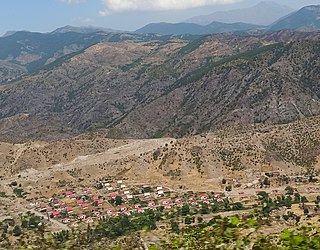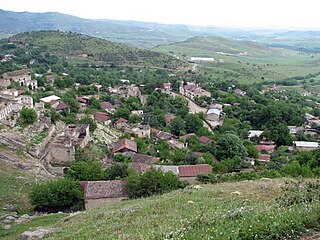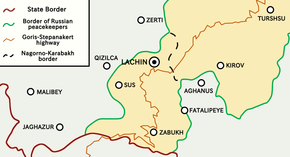
Artsakh, officially the Republic of Artsakh or the Republic of Nagorno-Karabakh, was a breakaway state in the South Caucasus whose territory was internationally recognised as part of Azerbaijan. Between 1991 and 2023, Artsakh controlled parts of the former Nagorno-Karabakh Autonomous Oblast of the Azerbaijani Soviet Socialist Republic, including its capital Stepanakert. It had been an enclave within Azerbaijan from the 2020 Nagorno-Karabakh war until the 2023 Azerbaijani offensive, when the Azerbaijani military took control over the remaining territory controlled by Artsakh. Its only overland access route to Armenia after the 2020 war was via the 5 km (3.1 mi) wide Lachin corridor, which was placed under the supervision of Russian peacekeeping forces.

The Nagorno-Karabakh conflict was an ethnic and territorial conflict between Armenia and Azerbaijan over the region of Nagorno-Karabakh, inhabited mostly by ethnic Armenians until 2023, and seven surrounding districts, inhabited mostly by Azerbaijanis until their expulsion during the 1990s. The Nagorno-Karabakh region was entirely claimed by and partially controlled by the breakaway Republic of Artsakh, but was recognized internationally as part of Azerbaijan. Azerbaijan gradually re-established control over Nagorno-Karabakh region and the seven surrounding districts.

Lachin is a town in Azerbaijan and the administrative centre of the Lachin District. It is located within the strategic Lachin corridor, which linked the region of Nagorno-Karabakh with Armenia.

Arayik Vladimiri Harutyunyan is an Armenian politician who served as the fourth president of the Republic of Artsakh from May 2020 to September 2023. Under his predecessor Bako Sahakyan, he served as the sixth and last Prime Minister from 2007 until the abolishment of that position in 2017 and as the first State Minister of the Republic of Artsakh from 2017 until his resignation in 2018. Harutyunyan led Artsakh through the 2020 Nagorno-Karabakh War with Azerbaijan, during which the republic lost most of the territory under its control. He resigned on 1 September 2023 in the midst of the Azerbaijani blockade of Nagorno-Karabakh.

Zabukh or Aghavno is a village in the Lachin District of Azerbaijan. The village came under the control of the breakaway Republic of Artsakh after 1992 and was renamed Aghavno and settled by Armenians. Following the 2020 Nagorno-Karabakh war, Zabukh came under the control of the Russian peacekeeping forces in Nagorno-Karabakh. On 26 August 2022, Azerbaijan regained control of Zabukh along with other settlements located along the former route of the Lachin corridor, including Lachin and Sus.

Sus is a village in Lachin District of Azerbaijan. It was formerly under the supervision of the Russian peacekeeping force following the ceasefire agreement that ended the 2020 Nagorno-Karabakh war. The village came under the de facto control of the breakaway Republic of Artsakh from 1992–2022, administrated as part of its Kashatagh Province, and is de jure part of the Lachin District of Azerbaijan. As of 26 August 2022, Azerbaijan regained control of villages in the Lachin corridor, including Lachin, Sus, and Zabukh.

Tugh or Togh is a village in the Khojavend District of Azerbaijan, in the region of Nagorno-Karabakh. The village had a mixed Armenian-Azerbaijani population before the First Nagorno-Karabakh War, the Azerbaijani inhabitants fled the fighting in 1991, and the Armenian population fled the village during the 2020 Nagorno-Karabakh war.

The Armenian-occupied territories surrounding Nagorno-Karabakh were areas of Azerbaijan, situated around the former Nagorno-Karabakh Autonomous Oblast (NKAO), which were occupied by the ethnic Armenian military forces of the breakaway Republic of Artsakh with military support from Armenia, from the end of the First Nagorno-Karabakh War (1988–1994) to 2020, when the territories were returned to Azerbaijani control by military force or handed over in accordance to the 2020 Nagorno-Karabakh ceasefire agreement. The surrounding regions were seized by Armenians under the justification of a "security belt" which was to be traded for recognition of autonomous status from Azerbaijan.

Lachin District is one of the 69 districts of Azerbaijan. It is located in the west of the country, belonging to the East Zangezur Economic Region. The district borders the districts of Kalbajar, Khojaly, Shusha, Khojavend, Qubadli, and the Syunik Province of Armenia. Its capital and largest city is Lachin. As of 2020, the district had a nominal population of 78,600.

The political status of Nagorno-Karabakh remained unresolved from its declaration of independence on 10 December 1991 to its September 2023 collapse. During Soviet times, it had been an ethnic Armenian autonomous oblast of the Azerbaijan Soviet Socialist Republic. Following the dissolution of the Soviet Union, a conflict arose between local Armenians who sought to have Nagorno-Karabakh join Armenia and local Azerbaijanis who opposed this.
The Lachin offensive was a military operation launched by Azerbaijan against the unrecognized Republic of Artsakh and their Armenian allies along the Armenia–Azerbaijan border during the Second Nagorno-Karabakh War, with the suspected goal of taking control of the Lachin corridor. The offensive began in mid-October, when the Azerbaijani forces advanced into Qubadlı and Laçın Districts after capturing Zəngilan. On 25 October, the Azerbaijani forces seized control of the city of Qubadlı.

In the aftermath of the Second Nagorno-Karabakh War, peacekeeping operations were initiated by Russia in the Nagorno-Karabakh region to monitor the ceasefire between the Armenian and Azerbaijani forces. Separate from the Russian operation, Turkey also has personnel working in a joint Russian–Turkish monitoring centre.

The military forces of Armenia and Azerbaijan have been engaged in a border conflict since 12 May 2021, when Azerbaijani soldiers crossed several kilometers into Armenia in the provinces of Syunik and Gegharkunik. Despite international calls for withdrawal from the European Parliament, the United States, and France, Azerbaijan has maintained its presence on Armenian soil, occupying at least 215 square kilometres (83 sq mi) of internationally recognized Armenian territory. This occupation follows a pattern of Azerbaijan provoking cross-border fights and instigating ceasefire violations when its government is unhappy with the pace of negotiations with Armenia.

The Zangezur corridor is a concept for a transport corridor which, if implemented, would give Azerbaijan unimpeded access to Nakhchivan Autonomous Republic without Armenian checkpoints via Armenia's Syunik Province and, in a broad sense, for the geopolitical corridor that would connect Turkey to the rest of the Turkic world thereby "uniting it". The concept was not part of the 2020 Nagorno-Karabakh ceasefire agreement but was introduced to geopolitical lexicon later by Ilham Aliyev. It has since been promoted by Azerbaijan and Turkey, while Armenia has steadily objected to it, asserting that "corridor logic" deviates from the ceasefire statement, and that it is a form of propaganda.
Events of the year 2023 in Armenia.
This is a list of individuals and events related to Azerbaijan in 2023.

The blockade of Nagorno-Karabakh was an event in the Nagorno-Karabakh conflict. The region was disputed between Azerbaijan and the breakaway Republic of Artsakh, internationally recognised as part of Azerbaijan, which had an ethnic Armenian population and was supported by neighbouring Armenia, until the dissolution of Republic of Artsakh on 28 September 2023.

Between 19 and 20 September 2023, Azerbaijan launched a large-scale military offensive against the self-declared breakaway state of Artsakh, a move seen as a violation of the ceasefire agreement signed in the aftermath of the Second Nagorno-Karabakh War in 2020. The offensive took place in the disputed region of Nagorno-Karabakh, which is de jure a part of Azerbaijan, and was a de facto independent republic. The stated goal of the offensive was the complete disarmament and unconditional surrender of Artsakh, as well as the withdrawal of all ethnic Armenian soldiers present in the region. The offensive occurred in the midst of an escalating crisis caused by Azerbaijan blockading Artsakh, which has resulted in significant scarcities of essential supplies such as food, medicine, and other goods in the affected region.

On 19–20 September 2023 Azerbaijan initiated a military offensive in the disputed Nagorno-Karabakh region which ended with the surrender of the self-declared Republic of Artsakh and the disbandment of its armed forces. Up until the military assault, the region was internationally recognized as part of Azerbaijan but governed and populated by ethnic Armenians.

















